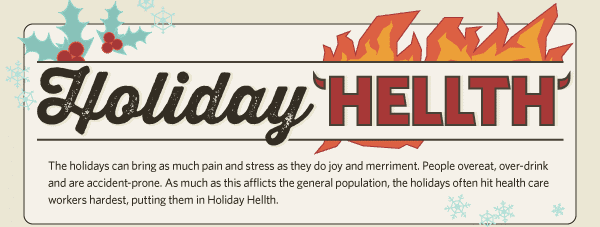Click for Holiday Hellth Infographic
The holidays get most people excited for time off, festive decorations, yummy food and celebration. But, injuries, illness and accidents don’t take a holiday vacation – and neither do all health care workers.
While you’re unwrapping presents, health care professionals are on duty. According to CareerBuilder, 28% of health care professionals have to work on Thanksgiving, compared to 17% of all other U.S. workers.1 And, it’s no wonder why. According to the Centers for Disease Control and Prevention, from 2000 through 2003, an estimated 17,465 people were treated in U.S. hospital emergency rooms for holiday decorating-related falls – that’s approximately 5,800 people a year.2 For health care workers, this means they are needed on-hand to help treat these unfortunate decorators, leading to increased workloads and long shifts over the holidays. Here are a few tips to help health care workers manage their Holiday Hellth. Increased workloads, long shifts and holiday errands will leave you exhausted! Be sure to take some time to rest and recharge.
- Meditate: Research shows that meditation is an effective form of stress management. 3 Sign up for a yoga class or simply allot some time to yourself to have quiet time and unwind.
- Seek emotional support: Sharing your concerns or feelings with someone you trust can be a very cathartic process. Talk to a friend or family member about issues that may be bothering you.
- Get some sleep: According to the National Institutes of Health, adults need a minimum of 7-8 hours of sleep a day.4 While this might not always be possible for those in the health care field, it is important to strive for a healthy balance of work and rest. In order to maximize your rest, try developing a routine before bed. Research shows keeping the television out of your bedroom is also helpful in optimizing your bedroom for quality sleep.5
All those holiday foods will look incredibly tempting, but all those calories can add up quick. A study by the National Institute of Child Health and Human Development found that Americans generally gain about 1lb each year between Thanksgiving and New Year’s Day.6 It’s ok to indulge in some of your favorite dishes but balance out the unhealthy options with servings of fruits and vegetables.
- Bring a healthy dish: With holiday parties and potlucks, it may be difficult to balance fatty foods with healthier options. The best solution to this is to bring your own healthy dish or snack to share.
- Serve smaller portions: Serving smaller portions helps you manage the amount of unhealthy foods you consume while allowing you to indulge in some of your favorite holiday foods. Also focus on taking smaller bites and properly chewing your food, which can also help with digestion.7
- Listen to your body: It is common for people to overeat during the holidays. Pay attention to how you feel during meals and when you start to feel full, stop eating.
On top of extra pounds and more patients to care for, longer hours and missing family celebrations can add to stress for health care workers. Finding small ways to increase physical activity can not only help keep those extra pounds at bay but can also help manage stress.
-
- Take the stairs: Opt for the stairs rather than taking the elevator.8 The first couple times might leave you huffing and puffing, but in no time taking the stairs will become a habit.
- Choose the farther parking spot: Parking a bit farther from the door while running errands won’t take much more of your time, but it can help you increase your physical activity throughout the day.9
- Purchase a pedometer: A study in 2003 found that wearing a pedometer led to an increase awareness of daily activity and also lead to increased physical activity.10
As the holiday season approaches and we become preoccupied with preparations, Carrington urges health care workers to take steps to remaining healthy over the holidays and avoid Holiday Hellth. For information about Carrington’s health care career programs visit: https://carrington.edu. 1 CareerBuilder. Approximately One-in-five Workers Will Spend Thanksgiving With Co-Workers, Finds New CareerBuilder Thanksgiving Survey (2012). http://www.careerbuilder.com/share/aboutus/pressreleasesdetail.aspx?sd=11%2F19%2F2012&id=pr725&ed=12%2F30%2F2012 2Centers for Disease Control and Prevention. Fall-Related Injuries During the Holiday Season — United States, 2000—2003 (2004). http://www.cdc.gov/mmwr/preview/mmwrhtml/mm5348a1.htm 3 CNN Health. Meditation: A simple, fast way to reduce stress (2011). http://www.cnn.com/HEALTH/library/meditation/HQ01070.html 4National Institutes of Health. How Much Sleep Is Enough? (2012). http://www.nhlbi.nih.gov/health/health-topics/topics/sdd/howmuch.html 5Harvard Medical School. Twelve Simple Tips to Improve Your Sleep (2007). http://healthysleep.med.harvard.edu/healthy/getting/overcoming/tips 6National Institute of Child Health and Human Development. Holiday Weight Gain Slight, But May Last a Lifetime (2000). http://www.nichd.nih.gov/news/releases/pages/holidayweightgain.aspx 7 Marsh, B.R. Chewing Food More Thoroughly Aids Digestion and Has Many Benefits (2008). http://voices.yahoo.com/chewing-food-more-thoroughly-aids-digestion-has-2136674.html?cat=5 8Trinkoff, A.M., Geiger-Brown, J.M., Caruso, C.C., Lipscomb, J.A., Johantgen, M., Nelson, A.L., et al. Personal Safety for Nurses. http://www.ahrq.gov/professionals/clinicians-providers/resources/nursing/resources/nurseshdbk/TrinkoffA_PSN.pdf. 9Trinkoff, A.M., Geiger-Brown, J.M., Caruso, C.C., Lipscomb, J.A., Johantgen, M., Nelson, A.L., et al. Personal Safety for Nurses. http://www.ahrq.gov/professionals/clinicians-providers/resources/nursing/resources/nurseshdbk/TrinkoffA_PSN.pdf. 10 Rooney B, Smalley K, Larson J, Havens S. Is knowing enough? Increasing physical activity by wearing a pedometer (2003). http://www.ncbi.nlm.nih.gov/pubmed/12967019




